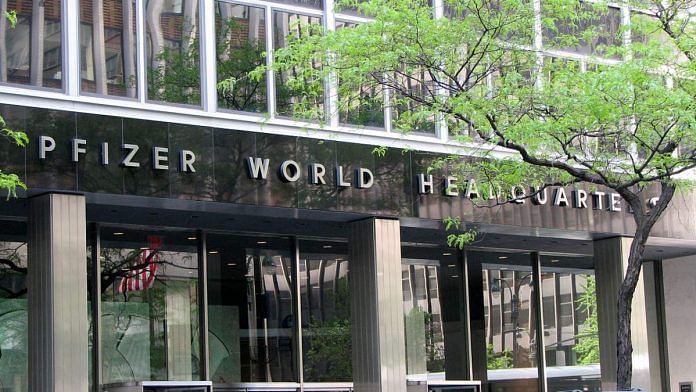New Delhi: American pharmaceutical giant Pfizer has created quite a flutter with its claim that its vaccine has achieved 90 per cent efficacy during an interim analysis. This is because most vaccines around the world are looking at the 50 per cent efficacy benchmark set by the World Health Organization (WHO).
If the company’s 90 per cent claim, made in a statement and not in a peer reviewed journal, holds, then Pfizer’s messenger RNA-based vaccine would be at par with some of the best childhood vaccines such as polio and measles.
In this explainer, ThePrint takes you through the claims, what they mean in the long run and why the most important question for India may be not the efficacy but the cost of the vaccine.
What announcement has Pfizer made?
In a statement Monday, Pfizer said that its mRNA-based vaccine candidate, BNT162b2, has been shown to prevent infection by the SARS-CoV-2 virus in 90 per cent of the trial participants. This is the first interim analysis of the vaccine that was conducted when 94 confirmed Covid cases were reported. The final analysis will happen at 194 cases.
The Phase 3 clinical trial of BNT162b2 began on 27 July and has enrolled 43,538 participants to date, 38,955 of whom have received a second dose of the vaccine candidate as of 8 November.
“The study also will evaluate the potential for the vaccine candidate to provide protection against Covid-19 in those who have had prior exposure to SARS-CoV-2, as well as vaccine prevention against severe Covid-19 disease,” the company said in its statement.
“In addition to the primary efficacy endpoints evaluating confirmed Covid-19 cases accruing from 7 days after the second dose, the final analysis now will include, with the approval of the FDA, new secondary endpoints evaluating efficacy based on cases accruing 14 days after the second dose as well.”
In collaboration with the German company BioNTech, Pfizer expects to produce globally up to 50 million vaccine doses in 2020 and up to 1.3 billion doses in 2021.
Also read: The Turkish-German doctor couple behind BioNTech and Pfizer’s promising Covid vaccine
Why is this good news?
Most vaccines currently in trial in various parts of the world, including in India, are aiming for a 50 per cent efficacy benchmark, as laid down by the World Health Organization.
Vaccine efficacy is defined as percent reduction in disease incidence in a vaccinated group compared to an unvaccinated group under optimal conditions. This is the first phase III interim analysis that has come out from any Covid vaccine trial that would now put the Pfizer vaccine ahead of Oxford University’s ChAdOx1 nCoV-19 that is currently in phase III trials in many countries including India.
The results are stunning, accepts Dr Gagandeep Kang, Professor in the Department of Gastrointestinal Sciences at the Christian Medical College, Vellore, and formerly the executive director of the Translational Health Science and Technology Institute, who was also a member of the Covid-19 task force.
She, however, warned that the efficacy usually dips a little in the final analysis.
“This is very very good news but this is one readout. When you are looking at what you want in a vaccine, you want one that prevents disease and you also want it to prevent severe disease,” Dr Kang said. “Usually both come together but I would definitely want a handout on severe disease. Also on how long the protection lasts. This is early in the study and efficacy may look better. The efficacy may decline over a longer period, I very much doubt that it will stay at 90 per cent. But Pfizer was aiming at 60 per cent efficacy; it will certainly meet that. Normally at final analysis the efficacy reduces by 4-5 per cent.”
Dr Kang added that the fact that the vaccine has turned out to be more efficacious than earlier thought raises hope for all other vaccines. Though mRNA vaccines are thought to be relatively safe, the vaccine has been mandated by the FDA to undergo a two-month safety followup.
Also read: Our Covid vaccine could be important part of India’s early response, pharma giant Pfizer says
The other vaccines in the race
There are several vaccines around the world in late stage trials. These include three in India — trials are being conducted by Bharat Biotech, Zydus Cadila and Serum Institute. There is also the Russian vaccine Sputnik V developed by Gamaleya Institute, the Chinese vaccine by Cansino Biologics and the vaccine that has been developed by Moderna Therapeutics and is under trials at the National Institute of Allergy and Infectious Diseases. The last, like the Pfizer vaccine, is also an mRNA based vaccine.
While all eyes are on which vaccine makes it to the finish line first, for India, the key question will also be how much the vaccine costs.
mRNA vaccines are usually costlier and initial estimates of the Moderna Vaccine peg the cost at $37 (around Rs 2,750). Compared to Serum’s promise of a $3 (around Rs 220) vaccine that could increase the costs of vaccinating a population of 1.3 billion at least tenfold. mRNA vaccines are also more difficult to store — they require a temperature of -80 degrees.
How does an mRNA vaccine work?
mRNA or messenger RNAs carry the code for building relevant proteins form the nucleus to the ribosomes that produce the protein. In case of Covid, the idea is to give the cell the information about the SARS-CoV2 spike protein, based on which the body then can prepare antibodies so that when an actual infection happens, the immune response can be mounted faster and with greater efficiency.
Both mRNA vaccines and DNA vaccines are also supposed to be relatively safer.
Also read: Pfizer Covid vaccine’s funding came from Berlin, not Washington



